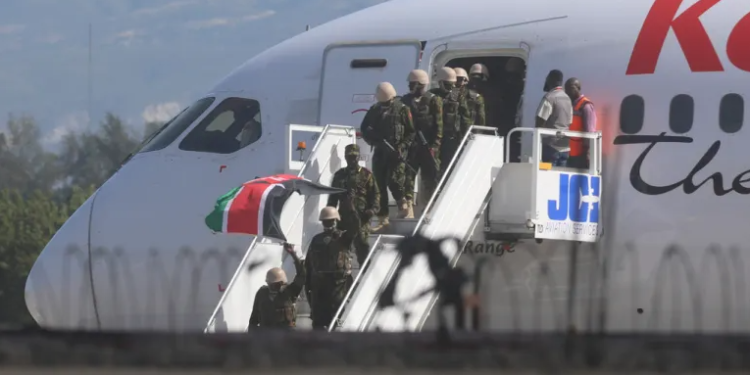“Kenyan police arrive at Toussaint Louverture International Airport in Port-au-Prince, Haiti, on Tuesday, June 25, 2024. [Odelyn Joseph/AP Photo]”
June 26, 2024 Story by: Editor
A contingent of Kenyan police officers has arrived in Haiti, marking the start of a United Nations-supported mission to address the rampant armed gangs causing turmoil in the Caribbean nation.
Sporting Kenyan flags and dressed in camouflage uniforms, several hundred Kenyan police officers arrived at Toussaint Louverture International Airport near Port-au-Prince on Tuesday. Currently, over 80 percent of the city is under gang control.
“I commend — and am deeply grateful to — all the countries that have pledged personnel and financial support to this mission,” U.S. President Joe Biden stated on Tuesday, highlighting that the U.S. contributed $360 million to the effort.
While the UN has urged the global community to send a security force to Haiti, the country’s fraught history of foreign interventions has led to skepticism about the mission. Critics point to the lack of clear objectives and plans.
“What is going to happen vis-a-vis the gangs?” questioned Romain Le Cour Grandmaison, a senior expert at the Global Initiative Against Transnational Organized Crime. “Is it a static mission? Is it a moving mission? All those details are still missing, and I think it’s about time that there’s actually transparency.”
In contrast, Haitian Prime Minister Garry Conille expressed support for the initiative earlier on Tuesday. “The country is going through very difficult times,” he said. “We’re going to start working little by little to retake the country.”
Conille, appointed last month as part of a transitional government, emphasized the need for this effort amid Haiti’s ongoing crisis, which has persisted since the assassination of President Jovenel Moise in 2021.
Monica Juma, a security adviser to Kenyan President William Ruto, spoke alongside Conille, describing the Kenyan forces as “agents of peace, of stability, of hope.”
However, as the Kenyan forces landed in Haiti, back in Nairobi, Kenyan police opened fire on protesters attempting to storm parliament, resulting in several deaths and numerous injuries.
“The police should be able to operate well in their own country, but they can’t,” said Enock Alumasi Makanga, a former Kenyan police officer now in private security. “How do you think they can manage then when they arrive in Haiti?”
Responding to inquiries about the incident, Biden administration spokesperson Matthew Miller assured that the U.S. and other nations had “vetted the Kenyan personnel” for the Haiti mission, emphasizing the importance of human rights.
The Kenyan police are the first group of an anticipated international force in Haiti, expected to grow to around 2,500 police officers from 15 other countries.
A previous UN mission from 2004 to 2017 did little to improve Haiti’s conditions and was marred by allegations of sexual assault and a cholera outbreak that claimed an estimated 10,000 lives. Since then, gangs have expanded their influence, exploiting the power vacuum left by Haiti’s government. This year alone, a record 578,074 people have been displaced due to violence, and nearly half of the population is experiencing severe hunger. Source: Aljazeera

















